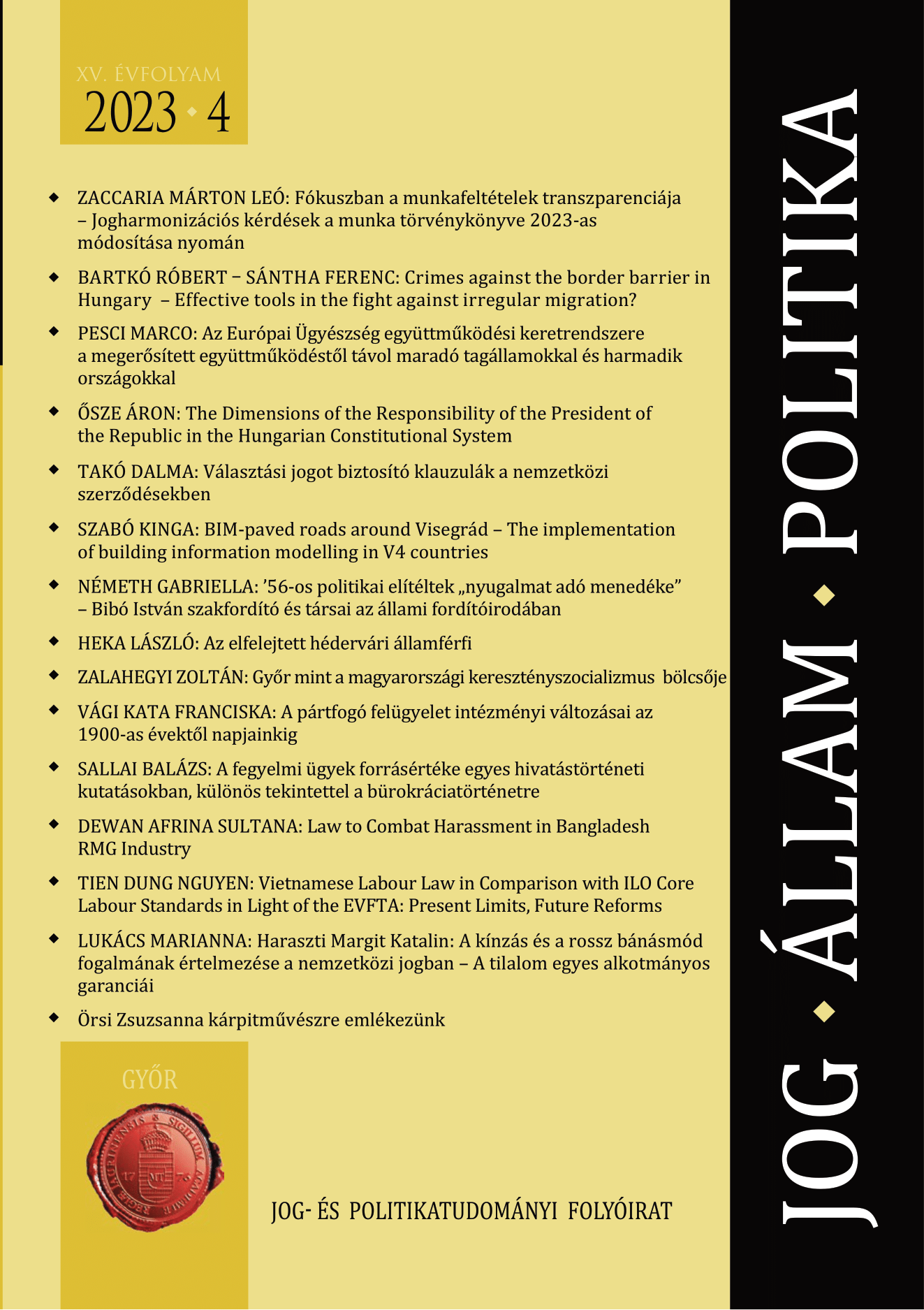Választási jogot biztosító klauzulák a nemzetközi szerződésekben
ABSTRACT
The study deals with international treaty clauses that provide possibility of choice, which are considered nowadays as a generally accepted instrument for individualisation of international treaties. The use of these clauses is explicitly permitted in the law of treaties, whereby international treaties can provide the parties various ways to shape the content of the agreement according to their national needs and interests. Although these clauses can be found in many international treaties, so far they have not been examined in detail. In order to remedy this deficiency, the paper gives a definition for the clauses, presents the examples found in international treaties, categorises these examples, analyses the rules governing the application of the clauses and examines the limits of their application. With the help of these issues, the study aims to provide an insight into the specific features of these provisions, illuminating the mechanisms by which they operate and revealing the reasons for their use.
KEYWORDS
choice of differing provisions * partial consent to be bound * international law * international treaty * possibility of choice
BIBLIOGRAPHY
Bokorné Szegő Hanna (1960): A nemzetközi szerződésekhez fűzött fenntartások kérdése. In: Jogtudományi Közlöny. XV/1-2. szám.
Bunn-Livingstone, Sandra L. (2002): Juricultural Pluralism Vis-á-Vis Treaty Law. State Practice and Attitudes. Martinus Nijhoff publishers, The Hague.
DOI: https://doi.org/10.1163/9789047403104.
Cali, Basak (2010): International Law for International Relations. Oxford University Press, Oxford.
Devidal, Pierrick (2003): Reservations, Human Rights Treaties in the 21st Century: from Universality to Integrity. LLM Theses and Essays.
Hoffmeister, Frank (2012): Article 10. Authentication of the Text. In: Dörr, Oliver – Schmalenbach, Kirsten: Vienna Convention on the Law of Treaties. A Commentary. Springer, Heidelberg.
DOI: https://doi.org/10.1007/978-3-662-55160-8_12
Hogg, James F. (1959): The International Court: Rules of Treaty Interpretation. In: Minnesota Law Review. Vol. 43/1959.
Hudson, Manley O. (1934): The Membership of the United States in the International Labor Organization. In: The American Journal of International Law. Vol. 28, No. 4.
DOI: https://doi.org/10.2307/2190754.
Krieger, Heike (2012): Article 25. Provisional Application. In: Dörr, Oliver – Schmalenbach,
Kirsten: Vienna Convention on the Law of Treaties. A Commentary. Springer, Heidelberg. DOI: https://doi.org/10.1007/978-3-662-55160-8_28.
Nixon, Richard – Rogers, William P. (1972): Vienna Convention on the Law of Treaties. In: The International Lawyer. 6/2. szám.
Prost, Mario (2012): The Concept of Unity in Public International Law. Hart Publishing, Oxford.
Redgwell, Catherine (1993): Universality or Integrity? Some Reflections on Reservations to General Multilateral Treaties. In: British Yearbook of International Law. 64/1. sz.
DOI: https://doi.org/10.4324/9781315086088-7.
Villiger, Mark E. (2009): Commentary on the 1969 Vienna Convention on the Law of
Treaties. Martinus Nijhoff Publishers, Leiden – Boston.
DOI: https://doi.org/10.1163/ej.9789004168046.i-1058.
Walter, Christian (2012a): Article 19. Formulation of Reservations. In: Dörr, Oliver – Schmalenbach, Kirsten: Vienna Convention on the Law of Treaties. A Commentary. Springer, Heidelberg.
DOI: https://doi.org/10.1007/978-3-662-55160-8_21.

